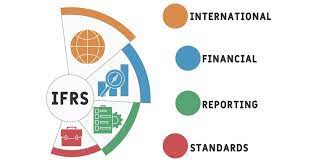Are you a professional accountant seeking IFRS courses in India? Would you wish to widen your professional horizons by pursuing overseas job opportunities? Then this blog is for you to go more into the objectives of the IFRS. I’d like to offer you a brief overview of the International Financial Reporting Standards (IFRS) before presenting the guide to the objectives of IFRS in 2022.
The International Financial Reporting Standards (IFRS) are a set of rules and regulations issued by the International Financial Reporting Standards Foundation, a London-based international non-profit organization, and promoted by the International Accounting Standards Board (IASB), which is an independent body of IFRS.
South Korea, Brazil, the European Union, India, Hong Kong, Australia, Malaysia, Pakistan, the Gulf Cooperation Council, Russia, Chile, the Philippines, Kenya, South Africa, Singapore, and Turkey are among the over 140 jurisdictions requiring IFRS Standards.
The International Financial Reporting Standards Foundation (IFRS Foundation) has created and issued profiles on the use of IFRS Standards in various industries to measure progress toward a unified set of global accounting standards. These are based on information from a variety of sources. The responses of standard-setting organizations and other significant entities to an IFRS Foundation review were the starting point. 166 conceptual framework profiles have been developed as of August 2019, with 166 wards necessitating the adoption of IFRS Standards.

The main goal of IFRS is to promote in 2022 a single set of high-quality, global accounting standards that require high-quality, transparent, and comparable information in financial statements and other financial reporting to assist participants in the world’s capital markets and other users in making economic decisions.
1. Quality
The term “quality” has long been used in the International Financial Reporting Standards (IFRS) to refer to firm attributes that are seen to be predictors of business success and growing stock prices. Quality has become a commonly used factor, akin to value and scale, as a sign of corporate success.
2. Understandable
One of the Objectives of IFRS (International Financial Reporting Standards) is to make accounting more understandable. This concept states that financial data should be presented in such a way that a reader may readily comprehend it. This notion presupposes that the reader has a basic understanding of business, but it does not necessitate sophisticated business knowledge to achieve a high degree of comprehension.
3. Enforacable
Enforcement is defined as a “compliance analysis” of the financial information presented by a company to ensure that accounting rules are followed. Enforcement is one of the most important Objectives of IFRS in 2022, as it ensures IFRS compliance and accounting excellence.
4. Faithful representation
Faithful representation is also one of the objectives of IFRS 2022. The budget reports give all of the data that a client expects to get a reasonable image of an organization’s outcomes, monetary status, and incomes. This also implies that no information is left out that could lead a user to generate a negative impression of the company. The financial statements should be free of inaccuracies so that the information they include gives a true picture of the company. If a sequence of “errors” occurs over time that tends to skew the outcomes of financial statements in one direction, it may be termed financial reporting fraud. The financial accounts depict the true situation of a business without exaggerating or exaggerating its results.
5. Maintaining consistency
Consistency is one of the objectives of IFRS, often known as the consistency notion, which ensures that activities and occurrences are documented consistently from one reporting year to another. When discussing various financial measures. Simply expressed, the Consistency Principle states that once your business, or more particularly, your bookkeeper or accounting department, adopts an accounting principle or way of capturing and disclosing information, it must continue to utilize that technique regularly in the future.
6. Transparency
Transparency refers to the economic reporting procedure in which businesses disclose their financial information to the public. This involves the delivery of standard accounting information such as income statements, accounting records, statements of cash flow, and retained earnings statements. By increasing transparency and discouraging insolvency managers from participating in creative accounting procedures, the introduction of IFRS could help to improve the informativeness of financial disclosures.
7. Access to foreign capital in terms of investment
IFRS specialists with a good comprehension of these principles are in high demand due to accountants’ constant modifications to these standards. For Indian bookkeeping specialists, IFRS adoption will be similar to programming expertise; at the end of the day, there will be a large acquisition potential. Financial backers from all across the world are being urged to donate, resulting in the initiative receiving more unconventional finances.
8. Standardization of accounting and financial reporting
Standardization promotes innovation by providing standardized processes and trustworthy data, which reduce time in the invention process, and by making it easier to share ground-breaking ideas and knowledge about cutting-edge techniques. Revenue recognition, asset classification, permitted techniques for depreciation, what is considered depreciable, lease classifications, and outstanding share measurement is all examples of accounting standards.
9. Flexibility
Financial flexibility is an accounting phrase that describes a company’s capacity to respond to unforeseen expenses and investment possibilities. Financial flexibility is typically measured by looking at the company’s leverage and cash holdings. Within the statement of cash flows, International Financial Reporting Standards (IFRS) allow managers to classify interest paid, interest received, and dividends received as operating, investing, or financing activities.
The cash-flow classification options of IFRS-reporting enterprises in 13 European nations, found that around 76, 60, and 57 percent of our sample classify interest paid, interest received, and dividends received, respectively, in OCF. The amount of OCF recorded under IFRS tends to be more than what would be reported under US GAAP.
10. comparable information from other financial statements
The data must be similar to the financial data reported for previous accounting periods so that consumers can spot patterns in the reporting entity’s performance and financial situation. Along with verifiability, timeliness, and understandability, comparability is one of the improving qualitative traits. Users’ capacity to recognize and grasp similarities and differences between items is characterized as comparability.
Advantages of IFRS course in 2022
- If identical auditing procedures are used all over the world, it gives accounting practitioners a great opportunity in any part of the world.
- IFRS consultants who are trained and qualified can broaden their services to assist firms in migrating to IFRS.
- Attempting to grasp these common concepts will open doors for IFRS-certified specialists all around the world, as IFRS has been accepted for use in financial reporting in more than 120 countries.
- Fiscal reports arranged in a standard manner are more accurate and assist investors in better understanding prospective investment opportunities than budget summaries generated using a distinct set of public accounting standards.
- The main objectives of IFRS are to rely on the integrity of financial backers from diverse countries to ensure that its financial reports comply with widely accepted accounting principles.
- Increase the amount of money available from new business sectors at a cheaper cost.
- Through the expansion of its global operations, it contributes to economic growth. Major donors from all around the world are now being asked to give, resulting in an influx of unique riches into the country.
- The application of IFRS principles is perplexing and time-consuming, highlighting the significance of IFRS professionals. The appointment of IFRS experts with a thorough comprehension of these standards is necessitated by the frequent adjustments of these standards by controllers.
Who can pursue IFRS in 2022?
- In the field of International Financial Reporting Standards, accountants are one of the most well-liked and respected professions. The ACCA certificate program is designed to help you develop a better grasp of the International Financial Reporting Standards (IFRS).
- This course will assist you in studying for the Diploma in IFRS test. Examine the distinctions between Ind-AS and DipIFR while studying for the DipIFR exam.
- Accountants, ICWAs, Company Secretaries, and other financial experts have all been sanctioned.
- Finance managers and in-charge accountants.
- MBAs have worked in the auditing business and have a background in finance.
- As a semi-qualified CA, ICWA, and CS, I work in the bookkeeping profession.
Scope for IFRS prorfessionals
The International Financial Reporting Standards (IFRS) have huge scope across the world and are designed to prevent the manipulation of financial statement data. This ensures that financial statement recognition and measurement are consistent. The International Financial Reporting Standards (IFRS) help economies all over the world achieve global harmony, uniformity, and comparability in financial statement production. The Financial Reporting Standards and Accounting Standards, which allow for the free movement of direct and indirect foreign investments across countries, provide a sense of confidence to international investors.
Conclusion
Expert IFRS consultants might expand their consultancies to help businesses transition to IFRS. More than 120 nations have given IFRS a green light in their accounting limits, so experimental data on these all-inclusive principles will open doors for IFRS assured experts all over the world. The objectives of IFRS are complicated and time-consuming, emphasizing the importance of IFRS professionals.
Consistent changes in these standards by accountants have created a demand for IFRS specialists who have a thorough understanding of these concepts. IFRS implementation for Indian bookkeeping specialists will be akin to programming expertise; at the end of the day, there will be a huge acquisition opportunity. Financial backers from all around the world are being asked to contribute, resulting in more unusual funds flowing into the project.
FAQ’s
Ans. Annually, between 24 lakhs and 50 lakhs
Ans. You must have at least two years of relevant experience in the finance industry or as a licensed accountant.
Ans. 1 to 3 months
Ans. NO, a candidate must have at least two years of experience or be a certified accountant.
Ans. GAAP is a rules-based accounting system, whereas IFRS is a standards-based accounting system. As a result, the IFRS’ fictional structure and standards provide more room for translation and may be used regularly.






